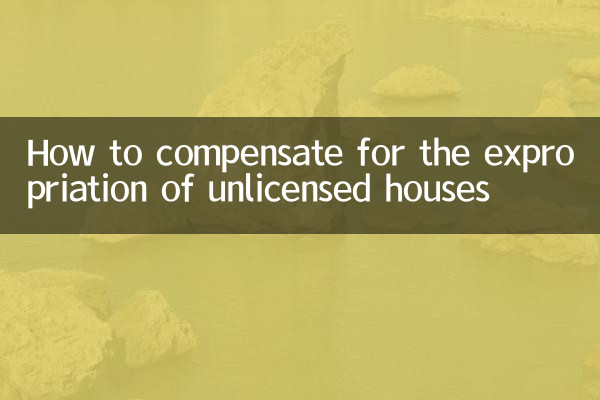How to compensate for the expropriation of unlicensed houses: policy interpretation and case analysis
In recent years, with the acceleration of urbanization, the issue of expropriation of undocumented houses in various places has attracted much attention. Undocumented houses usually refer to houses that have not obtained legal property rights certificates or have incomplete construction procedures. Their compensation standards and procedures often become the focus of controversy. This article combines hot topics across the Internet in the past 10 days, sorts out relevant policies and actual cases, and provides readers with a structured interpretation.
1. Identification standards for unlicensed houses

Compensation for unlicensed houses requires first clarifying their nature and causes. According to the Regulations on Expropriation and Compensation of Houses on State-Owned Land, unlicensed houses may be divided into the following categories:
| type | feature | Common compensation methods |
|---|---|---|
| historical house | It was built before the regulations were improved and the certificate was not issued due to policy reasons. | Refer to certified housing compensation |
| Illegal construction of houses | Failure to obtain planning permission or exceeding the scope of the permission | Partial compensation or no compensation |
| temporary building | Failure to dismantle beyond the approved period | Generally no compensation |
2. Compensation principles and differences in local policies
There are significant differences in compensation policies for unlicensed houses in various places, mainly considering the following factors:
| area | Compensation standard | Typical cases |
|---|---|---|
| Beijing | If built before 1984, 80% compensation will be provided | A village in Chaoyang District was compensated at 70% of the replacement price |
| Shanghai | Compensation can be negotiated if built before 2003 | Pudong New Area provides 50% compensation for licensed houses of the same type |
| Guangzhou City | If it was built before 1999, you can apply for confirmation of ownership | Some houses in Tianhe District receive 60% compensation |
3. Key points and legal approaches for rights protection
If there is any objection to the compensation plan, the rights holder can claim his or her rights through the following procedures:
1.Apply for administrative review: Submit a written review within 30 days after receiving the expropriation decision
2.File an administrative lawsuit: If you are not satisfied with the review result, you can sue within 6 months.
3.Evidence collection focus: It is necessary to provide proof of the age of house construction, records of payment of water and electricity bills, etc.
4. Latest developments in 2023
Recent hot events show that policies are being adjusted:
| time | event | Scope of influence |
|---|---|---|
| 2023.8.5 | The Ministry of Natural Resources issued a document requiring the distinction between historical issues and new illegal construction | Nationwide |
| 2023.8.12 | A pilot project in Zhejiang to confirm and register unlicensed houses | Yangtze River Delta region |
5. Expert advice
1. Consult a professional expropriation lawyer promptly to evaluate the legal status of the house
2. Pay attention to the latest compensation guide prices issued by local governments
3. If you have any objection to the evaluation report, you can apply for third-party review
In summary, compensation for unlicensed houses needs to take into account multiple factors such as construction time and policy background. It is recommended that rights holders actively participate in the negotiation process and safeguard their legitimate rights and interests in accordance with the law. As the renovation of old urban communities accelerates, relevant policies may be further optimized and adjusted.

check the details

check the details